We teach, practice, and promote the mathematical and computing sciences. Our programs prepare students for careers as software developers, actuaries, mathematicians, analysts, statisticians, systems administrators, underwriters, data scientists, project managers, and educators. Our general studies courses develop the abstract quantitative reasoning that is critical to sophisticated problem-solving. Computer Scientists commonly do three things: design and implement software, devise new ways to use computers, and develop effective ways to solve computing problems. They seek to understand why technology works, and apply that knowledge in practical ways. Concord’s curriculum is designed to give students a thorough understanding of computers; the physics of the hardware, the underlying mathematical principles; and the creation of software solutions. The curriculum’s design is guided by recommendations from the Association of Computing Machinery and the Institute for Electrical and Electronics Engineers. The core prepares students for a wide variety of careers and graduate school, but students can also choose one of three concentrations in which to specialize: Image by geralt downloaded from Pixabay (royalty-free). Information systems specialists use their technology knowledge and skills to help businesses and other organizations achieve their goals. Students in this major will learn how to organize, analyze, and apply data to implement effective, efficient, and secure technology solutions. Concord’s curriculum is designed to give students a strong background in computing that they can then apply to an area of interest. The curriculum’s design is guided by recommendations from the Association of Computing Machinery and the Institute for Electrical and Electronics Engineers. The core prepares students for a wide variety of careers and graduate school, but students can also choose one of five concentrations in which to specialize. Computer Scientists commonly do three things: design and implement software, devise new ways to use computers, and develop effective ways to solve computing problems. They seek to understand why technology works, and apply that knowledge in practical ways. Concord’s curriculum is designed to give students a thorough understanding of computers; the physics of the hardware; the underlying mathematical principles; and the creation of software solutions. Goals: Information systems specialists use their technology knowledge and skills to help businesses and other organizations achieve their goals. Students in this major will learn how to organize, analyze, and apply data to implement effective, efficient, and secure technology solutions. Goals: Concord’s curriculum is designed to give students a thorough understanding of the core tenants of cybersecurity: effective program management; prevention and detection of cybersecurity events; defensive architectures; managing responses and mitigations; and designing information systems securely. The program prepares students for a wide variety of careers and graduate school. Goals: A computer science minor can make your expertise more attractive to prospective employers who are looking for people with top-notch computer skills in today’s global business arena. You’ll also be better prepared to hit the ground running in an entry-level computer science job. Our graduates have attended graduate programs in mathematics, statistics, computer science, economics, business, and education at The University of Colorado at Boulder, The University of North Carolina – Chapel Hill, Fordham University, Texas A&M, Georgia Tech, Winthrop University, Bowling Green State University, The University of Illinois Urbana-Champaign, Virginia Tech, Marshall University, and West Virginia University. Our graduates have been hired by Intel, IBM, Red Hat, Highmark, Brickstreet, National Income Life, The Health Plan, First Community Bank, City National Bank, Capital One, Community Tissue Services, Shriner’s Hospital for Children, Global AlertLink, Fast Enterprises, HyperGen, Cvent, Turning Technologies LLC, Leidos, Lockheed Martin, Northrop Grumman, Technica Corporation, USC Institute for Creative Technologies, US News & World Report, The United States Air Force, The Department of the Navy, The Department of Environmental Protection, The Federal Bureau of Investigation, The West Virginia Department of Administration, ArcelorMittal, Compute One, FoxGuard Solutions, The Kanawha-Charleston Humane Association, The Raleigh County Sheriff’s Office, Concord University, Berry College, The University of Charleston, West Virginia School of Osteopathic Medicine, New River Community and Technical College, and local public school systems in both West Virginia and Virginia. Course registration and withdrawal from a course require a consultation appointment with your advisor. If your advisor is a faculty member in the Department of Mathematics and Computer Science then you can find your advisor’s contact information here (link to faculty). If you would like to change your major, please complete this online form (link to major change form). For a detailed description of our programs, including links to progression sheets, click here (link to progression sheets). If you would like to request a letter of recommendation from one of our faculty, please send the professor an email at least two weeks in advance of your application deadline with the following information: (1) the name of the program or employer to which you are applying, (2) the deadline and submission method for the letter, (3) a copy of your resume or vita, (4) a copy of your cover letter or personal statement, and (5) a list of qualities and achievements that you would like the recommender to emphasize in the letter. Consider joining the Hopper Turing Society! Everyone is welcome; you need not be a mathematics or computer science major to participate. Students seeking research opportunities can begin by checking our hallway bulletin board, talking to faculty, and exploring the following links: Some additional resources you might find helpful: If you are a student in one of our programs then you should also consider joining a professional organization:Computer Science

 Image by geralt downloaded from Pixabay (royalty-free).
Image by geralt downloaded from Pixabay (royalty-free).
Fall Odd
Spring Even
CS 151 Intro to Computer Science
CS 253 Software Engineering
CS 232 Intro to Computer Security
CS 282 Database and Information Management
CS 325 Computer Organization and Hardware
CS 331 Digital Forensics and Incident Response
CS 341 Cryptography
CS 352 Mobile Development
CS 381 System Analysis and Design
CS 456 Capstone ICS 151 Intro to Computer Science
CS 261 Intro to Intelligent Systems
CS 252 Data Structures
CS 283 Data Analytics
CS 221 Computer Networking
CS 351 Web Development
CS 374 Intro to Simulation and Modeling
CS 421 Operating Systems
CS 432 Reverse Engineering
CS 457 Capstone II
Fall Even
Spring Odd
CS 151 Intro to Computer Science
CS 232 Intro to Computer Security
CS 272 Human Centered Design
CS 281 Linux System Admin
CS 282 Database and Information Management
CS 332 Network Security
CS 353 Game Development
CS 382 Cybersecurity Program Management
CS 442 Analysis of Algorithms
CS 456 Capstone ICS 151 Intro to Computer Science
CS 221 Computer Networking
CS 261 Intro to Intelligent Systems
CS 252 Data Structures
CS 283 Data Analytics
CS 333 Secure Coding
CS 357 Parallel and Distributed Computing
CS 364 Data Visualization
CS 384 DevOps
CS 431 Penetration Testing
CS 457 Capstone II
Computer Science:
Computer Information Systems:
Cybersecurity:
Advising and Letters of Recommendation
Get Involved!
Computer ScienceBayleigh Meadows2024-12-03T10:36:55-05:00
We teach, practice, and promote the mathematical and computing sciences. Our programs prepare students for careers as software developers, actuaries, mathematicians, analysts, statisticians, systems administrators, underwriters, data scientists, project managers, and educators. Our general studies courses develop the abstract quantitative reasoning that is critical to sophisticated problem-solving.Computer Science


